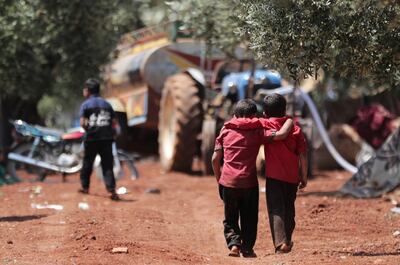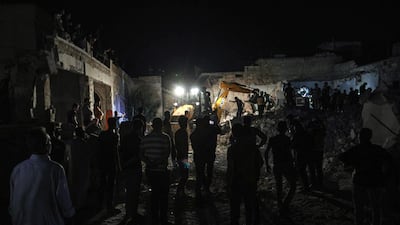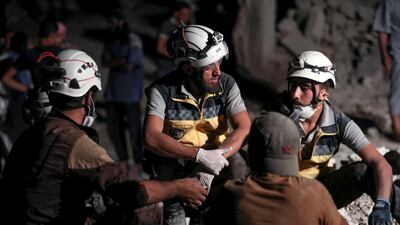The near-daily bombardment of Syria’s Idlib province is destroying not just homes and hospitals but also the hopes of children from all over the country whose education has already been disrupted by eight years of civil war.
More than 150,000 children have been forced to leave school since pro-government and allied Russian forces intensified attacks on the last rebel-held province and adjoining areas in recent months, according Mohamad Hallaj, director of the Response Co-ordination Group in northern Syria.
"Schools have been systematically bombarded to force inhabitants to leave," said Mr Hallaj told The National.
The RCG, an NGO documenting the conflict, says its teams confirmed the destruction of 72 schools in Syrian or Russian strikes between February 2 and June 9.
The assaults caused at least 697 civilian deaths, including those of 203 children, it said. More than 500,000 people were forced to flee the areas under attack.
Idlib’s estimated population of more than 3 million includes thousands of civilians who were already displaced from parts of Syria recaptured by President Bashar Al Assad’s forces.
Among them is 15-year-old Mohammed Ghorane, whose family fled the regime campaign to retake the Damascus suburb of Ghouta in February last year.
After his father was killed, he moved with his mother and six sisters to the town of Maaret Al Numan in southern Idlib. Now they have been forced to move again, this time to the town of Afrin in Syria’s north-east.
“The bombing in Ghouta was something beyond my words or ability to explain,” said Mohammed. “It’s the same here – the attacks were getting worse daily. Schools shut as they started to hit everything in our town.
“After a double air strike killed our neighbours, my family decided to flee to somewhere safe. So I am here in Afrin, working in a fabric shop to help my family instead of chasing my dream of becoming an architect,” he said.
“I hope one day I become one and build a new house for me and my family.”
Repeated displacement is putting families at risk, exhausting them physically and emotionally, and limiting their ability to seek aid and education for their children, said Sonia Khush, Syria director of Save the Children.
The NGO reported a particularly tragic case in late April, when three boys from the same family were killed in shelling that heavily damaged two Save the Children-supported schools near the town of Khan Sheikhoun. The children ran home after their school was hit but died when their family’s tent was also struck.
“Schools should be a safe place, and what we are seeing and hearing is horrific,” Ms Khush said.
Isam Khatib, executive director of Kesh Malek, a Syrian civil society organisation, said many educational facilities in northern Syria had to curtail or cancel classes and exams because children’s lives were at risk.
Kesh Malek has been working tirelessly to support pupils and fund schools in the region, "but our accelerated education project is in danger because of the intense attacks and instability”, Mr Khatib said.
He said the project’s staff visited families whose children were not going to school, to raise awareness about the importance of education and encourage them to send their children to Kesh Malek learning centres.
Over four to eight months, staff at the centres conduct therapy sessions to stimulate the youngsters’ dormant learning ability and prepare them to go back to school.
“What is important is to give children the motivation and power to study in spite of their horrifying experiences and circumstances,” Mr Khatib said.
Mr Khatib said that despite the programme’s success, with 70 per cent of children who take part going back to school, “our efforts could go with the winds if the attacks continue”.
He said future plans for the education sector across northern Syria were being affected by the risk from conflict and a severe shortage of funding.
But individuals such as Maryam Sherot are doing what they can to help.
Ms Sherot, 39, a specialist in accelerated education, set up a small institute in Maaret Al Numan where she and other teachers help children from across Syria to make up for lost years of schooling.
But with regime offensive forcing the closure of schools and the drying up of funding, the current situation is the worst education crisis she has seen in the past eight years. Large numbers of pupils have left or are unable to attend her classes for fear of sudden attacks.
“Students fled towards the borders. Even summer acceleration courses will not be able to be held here. It’s sad, but what else we can do?” Ms Sherot said.
“I love teaching and will always try to do something for children in my city. I will bring my neighbours’ children and give small circle lessons, or individual lessons free to any child who needs it.
“We need to act for them, because no one really cares.”
Formula%204%20Italian%20Championship%202023%20calendar
%3Cp%3EApril%2021-23%3A%20Imola%3Cbr%3EMay%205-7%3A%20Misano%3Cbr%3EMay%2026-28%3A%20SPA-Francorchamps%3Cbr%3EJune%2023-25%3A%20Monza%3Cbr%3EJuly%2021-23%3A%20Paul%20Ricard%3Cbr%3ESept%2029-Oct%201%3A%20Mugello%3Cbr%3EOct%2013-15%3A%20Vallelunga%3C%2Fp%3E%0A
COMPANY%20PROFILE
%3Cp%3E%3Cstrong%3EDate%20started%3A%3C%2Fstrong%3E%202020%3Cbr%3E%3Cstrong%3EFounders%3A%3C%2Fstrong%3E%20Khaldoon%20Bushnaq%20and%20Tariq%20Seksek%3Cbr%3E%3Cstrong%3EBased%3A%3C%2Fstrong%3E%20Abu%20Dhabi%20Global%20Market%3Cbr%3E%3Cstrong%3ESector%3A%3C%2Fstrong%3E%20HealthTech%3Cbr%3E%3Cstrong%3ENumber%20of%20staff%3A%3C%2Fstrong%3E%20100%3Cbr%3E%3Cstrong%3EFunding%20to%20date%3A%3C%2Fstrong%3E%20%2415%20million%3C%2Fp%3E%0A
Women%E2%80%99s%20Asia%20Cup
%3Cp%3ESylhet%2C%20Bangladesh%3Cbr%3E%3Cbr%3E%3Cstrong%3EUAE%20results%3C%2Fstrong%3E%3Cbr%3ELost%20to%20Sri%20Lanka%20by%2011%20runs%3Cbr%3E%3Cbr%3E%3Cstrong%3EUAE%20fixtures%3C%2Fstrong%3E%3Cbr%3ETue%20Oct%204%2C%20v%20India%3Cbr%3EWed%20Oct%205%2C%20v%20Malaysia%3Cbr%3EFri%20Oct%207%2C%20v%20Thailand%3Cbr%3ESun%20Oct%209%2C%20v%20Pakistan%3Cbr%3ETue%20Oct%2011%2C%20v%20Bangladesh%3C%2Fp%3E%0A
Labour dispute
The insured employee may still file an ILOE claim even if a labour dispute is ongoing post termination, but the insurer may suspend or reject payment, until the courts resolve the dispute, especially if the reason for termination is contested. The outcome of the labour court proceedings can directly affect eligibility.
- Abdullah Ishnaneh, Partner, BSA Law
Fixtures
Sunday, December 8, Sharjah Cricket Stadium – UAE v USA
Monday, December 9, Sharjah Cricket Stadium – USA v Scotland
Wednesday, December 11, Sharjah Cricket Stadium – UAE v Scotland
Thursday, December 12, ICC Academy, Dubai – UAE v USA
Saturday, December 14, ICC Academy, Dubai – USA v Scotland
Sunday, December 15, ICC Academy, Dubai – UAE v Scotland
Note: All matches start at 10am, admission is free
Essentials
The flights: You can fly from the UAE to Iceland with one stop in Europe with a variety of airlines. Return flights with Emirates from Dubai to Stockholm, then Icelandair to Reykjavik, cost from Dh4,153 return. The whole trip takes 11 hours. British Airways flies from Abu Dhabi and Dubai to Reykjavik, via London, with return flights taking 12 hours and costing from Dh2,490 return, including taxes.
The activities: A half-day Silfra snorkelling trip costs 14,990 Icelandic kronur (Dh544) with Dive.is. Inside the Volcano also takes half a day and costs 42,000 kronur (Dh1,524). The Jokulsarlon small-boat cruise lasts about an hour and costs 9,800 kronur (Dh356). Into the Glacier costs 19,500 kronur (Dh708). It lasts three to four hours.
The tours: It’s often better to book a tailor-made trip through a specialist operator. UK-based Discover the World offers seven nights, self-driving, across the island from £892 (Dh4,505) per person. This includes three nights’ accommodation at Hotel Husafell near Into the Glacier, two nights at Hotel Ranga and two nights at the Icelandair Hotel Klaustur. It includes car rental, plus an iPad with itinerary and tourist information pre-loaded onto it, while activities can be booked as optional extras. More information inspiredbyiceland.com
I Care A Lot
Directed by: J Blakeson
Starring: Rosamund Pike, Peter Dinklage
3/5 stars
Five expert hiking tips
Always check the weather forecast before setting off
Make sure you have plenty of water
Set off early to avoid sudden weather changes in the afternoon
Wear appropriate clothing and footwear
Take your litter home with you
Company%20profile
%3Cp%3EDate%20started%3A%20January%202022%3Cbr%3EFounders%3A%20Omar%20Abu%20Innab%2C%20Silvia%20Eldawi%2C%20Walid%20Shihabi%3Cbr%3EBased%3A%20Dubai%3Cbr%3ESector%3A%20PropTech%20%2F%20investment%3Cbr%3EEmployees%3A%2040%3Cbr%3EStage%3A%20Seed%3Cbr%3EInvestors%3A%20Multiple%3C%2Fp%3E%0A
The specs
Engine: 2.0-litre 4cyl turbo
Power: 261hp at 5,500rpm
Torque: 405Nm at 1,750-3,500rpm
Transmission: 9-speed auto
Fuel consumption: 6.9L/100km
On sale: Now
Price: From Dh117,059
COMPANY PROFILE
Company name: SimpliFi
Started: August 2021
Founder: Ali Sattar
Based: UAE
Industry: Finance, technology
Investors: 4DX, Rally Cap, Raed, Global Founders, Sukna and individuals
The%20pillars%20of%20the%20Dubai%20Metaverse%20Strategy
%3Cp%3EEncourage%20innovation%20in%20the%20metaverse%20field%20and%20boost%20economic%20contribution%3C%2Fp%3E%0A%3Cp%3EDevelop%20outstanding%20talents%20through%20education%20and%20training%3C%2Fp%3E%0A%3Cp%3EDevelop%20applications%20and%20the%20way%20they%20are%20used%20in%20Dubai's%20government%20institutions%3C%2Fp%3E%0A%3Cp%3EAdopt%2C%20expand%20and%20promote%20secure%20platforms%20globally%3C%2Fp%3E%0A%3Cp%3EDevelop%20the%20infrastructure%20and%20regulations%3C%2Fp%3E%0A
Tonight's Chat on The National
Tonight's Chat is a series of online conversations on The National. The series features a diverse range of celebrities, politicians and business leaders from around the Arab world.
Tonight’s Chat host Ricardo Karam is a renowned author and broadcaster who has previously interviewed Bill Gates, Carlos Ghosn, Andre Agassi and the late Zaha Hadid, among others.
Intellectually curious and thought-provoking, Tonight’s Chat moves the conversation forward.
Facebook | Our website | Instagram
Key findings of Jenkins report
- Founder of the Muslim Brotherhood, Hassan al Banna, "accepted the political utility of violence"
- Views of key Muslim Brotherhood ideologue, Sayyid Qutb, have “consistently been understood” as permitting “the use of extreme violence in the pursuit of the perfect Islamic society” and “never been institutionally disowned” by the movement.
- Muslim Brotherhood at all levels has repeatedly defended Hamas attacks against Israel, including the use of suicide bombers and the killing of civilians.
- Laying out the report in the House of Commons, David Cameron told MPs: "The main findings of the review support the conclusion that membership of, association with, or influence by the Muslim Brotherhood should be considered as a possible indicator of extremism."
What is graphene?
Graphene is extracted from graphite and is made up of pure carbon.
It is 200 times more resistant than steel and five times lighter than aluminum.
It conducts electricity better than any other material at room temperature.
It is thought that graphene could boost the useful life of batteries by 10 per cent.
Graphene can also detect cancer cells in the early stages of the disease.
The material was first discovered when Andre Geim and Konstantin Novoselov were 'playing' with graphite at the University of Manchester in 2004.
WORLD CUP SEMI-FINALS
England v New Zealand (Saturday, 12pm)
Wales v South Africa (Sunday, 1pm)
Results
Final: Iran beat Spain 6-3.
Play-off 3rd: UAE beat Russia 2-1 (in extra time).
Play-off 5th: Japan beat Egypt 7-2.
Play-off 7th: Italy beat Mexico 3-2.
MATCH INFO
Kolkata Knight Riders 245/6 (20 ovs)
Kings XI Punjab 214/8 (20 ovs)
Kolkata won by 31 runs











